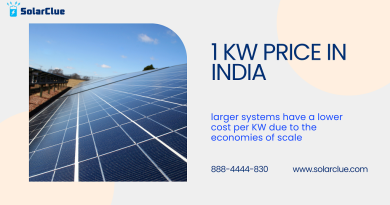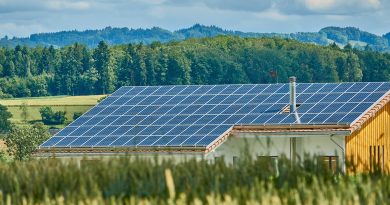Solar System Installation Guide: Harnessing the Sun
Installing a solar system at home is a smart and sustainable choice that can save you money in the long run while also reducing your carbon footprint. By harnessing the power of the sun, you can generate clean and renewable energy right from your own rooftop. However, installing a solar system can be a complex process if you’re not familiar with it. In this article, we will guide you through the steps of installing a solar system at home, from understanding your energy needs to choosing the right equipment and professionals to assist you, ensuring a seamless and efficient installation.
Table of Contents
Factors To Be Considered Before Solar Power System Installation
Determining Your Energy Needs
Before diving into the installation process, it’s important to assess your energy requirements. Take a look at your recent electricity bills and evaluate your average energy consumption. This will give you an idea of the capacity of the solar system you will need to meet your energy needs. Keep in mind that your energy consumption might vary over time, so a slight overestimation of your requirements could be wise.
Assessing Your Roof
It’s crucial to evaluate the condition and suitability of your roof for solar panel installation. Check whether your roof receives sufficient sunlight throughout the day and identify any potential obstructions such as tall buildings, trees, or chimneys that may cast shadows on the panels. Moreover, make sure your roof is structurally sound and can bear the weight of the solar system. If you have any concerns or doubts, consult a professional to conduct a thorough assessment before proceeding.
Choosing the Right Solar Panels
Selecting the right solar panels is essential to maximize the energy production and longevity of your solar system. There are various types of solar panels available, such as monocrystalline, polycrystalline, and thin-film solar panels. Monocrystalline panels are known for their efficiency and sleek appearance, while polycrystalline panels tend to have a lower price point. Consider your budget, energy requirements, and the available space on your roof before making a decision. It’s also advisable to opt for panels with a good warranty and certifications from reputable organizations.
Finding a Qualified Installer
While some DIY enthusiasts may be tempted to install the solar system themselves, it’s generally recommended to hire a qualified and experienced professional for a hassle-free installation. Look for licensed and certified solar installers who have a proven track record in the industry. You can seek recommendations from friends or family who have installed solar systems or explore online reviews to find trustworthy installers in your area. A reputable installer will guide you through the entire process and ensure compliance with local regulations.
Obtaining Necessary Permits
Before the installation commences, you will likely need to obtain permits and approvals from local authorities or homeowner associations. The specific requirements may vary depending on your location, so it’s crucial to research and fulfill these legal obligations before proceeding with the installation. Your solar installer should be well-versed in these requirements and can assist you in obtaining the necessary permits.
Installation Process
Once you have completed the preliminary steps, it’s time to move forward with the installation itself. Here is an overview of the typical installation process:
1. Site Inspection: Your solar installer will visit your home to conduct a detailed site inspection. They will take measurements, assess the electrical connections, and finalize the placement of the panels.
2. Mounting the Panels: The installer will attach racking or mounting systems onto your roof. These structures provide a secure base for the solar panels to be installed.
3. Wiring and Inverter Installation: The installer will connect the solar panels to the inverter, which converts the DC energy generated by the panels into AC energy suitable for your home’s electrical needs. They will also ensure the correct wiring connections and install necessary safety mechanisms.
4. Connection to the Electrical Grid: If you opt for a grid-tied system, the installer will connect your solar system to the electrical grid. This allows you to sell excess energy back to the grid or draw electricity when your solar system cannot meet your demand.
5. Testing and Inspection: After the installation is complete, the system will undergo thorough testing and inspection to ensure everything is functioning properly and meets safety standards.
Maintaining Your Solar System
Once your solar system is up and running, it’s essential to maintain it regularly to ensure optimum performance. While solar systems are generally low-maintenance, you should periodically clean the panels to remove dirt, leaves, or any other debris that may hinder their efficiency. Additionally, monitor your energy production through the system’s monitoring software or meters and contact your installer if you notice any significant drops in performance or suspect system malfunctions.
Conclusion
Embark on the journey towards a sustainable future by choosing Solarclue® for your solar system installation. Installing a solar system at home is a commendable step towards embracing renewable energy and reducing your environmental impact. By assessing your energy needs, evaluating your roof’s suitability, choosing the right equipment, finding a qualified installer, obtaining necessary permits, and following a structured installation process, you can ensure a successful and efficient solar system installation with Solarclue®.
With Solarclue®’s expertise, you not only contribute to a greener planet but also benefit from a reliable and high-performance solar solution. Our team is dedicated to guiding you through the entire process, ensuring that your solar system meets your energy requirements and is seamlessly integrated into your home.
Take the first step towards a sustainable future with Solarclue®. Explore the possibility of installing a solar system at your home, and let us help you harness the power of the sun for clean and efficient energy generation. Make a lasting impact on both your wallet and the planet by choosing Solarclue® for your solar installation needs.
Frequently Asked Questions
Professionals follow a structured process, including site assessment, design, permitting, installation, and connection to the grid.
Solarclue® specializes in a wide range of solar solutions, including residential, commercial, and industrial solar installations.
Yes, many solar systems can be paired with home battery solutions for energy storage and backup power.
Yes, various financing options, like loans and solar leases, are available to make solar installations more accessible.
Look for warranties on solar panels, inverters, and other components. Typically, warranties range from 10 to 25 years.
Yes, check with your local authorities for necessary permits and compliance with regulations before starting the installation.
Yes, solar systems can be installed on sloped roofs with proper mounting solutions to capture sunlight effectively.
Professionals use modeling tools to estimate energy production based on your location, system size, and energy consumption.
Ongoing costs include occasional maintenance, monitoring subscriptions, and, if applicable, battery replacement costs in the future.
Solarclue® offers flexible financing options, making clean energy solutions more accessible for homeowners and businesses.


